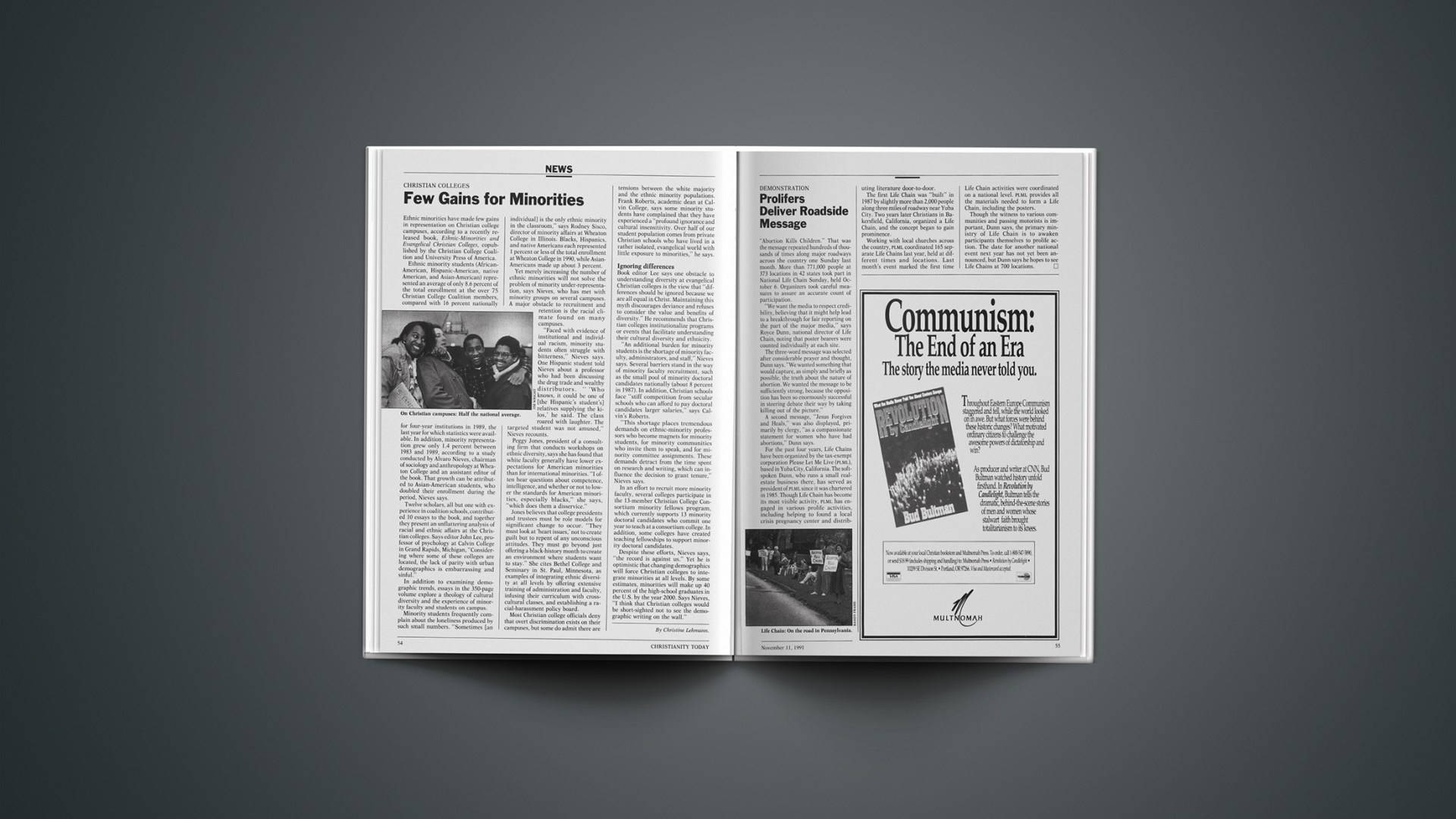Ethnic minorities have made few gains in representation on Christian college campuses, according to a recently released book, Ethnic-Minorities and Evangelical Christian Colleges, copublished by the Christian College Coalition and University Press of America.
Ethnic minority students (African-American, Hispanic-American, native American, and Asian-American) represented an average of only 8.6 percent of the total enrollment at the over 75 Christian College Coalition members, compared with 16 percent nationally for four-year institutions in 1989, the last year for which statistics were available. In addition, minority representation grew only 1.4 percent between 1983 and 1989, according to a study conducted by Alvaro Nieves, chairman of sociology and anthropology at Wheaton College and an assistant editor of the book. That growth can be attributed to Asian-American students, who doubled their enrollment during the period, Nieves says.
Twelve scholars, all but one with experience in coalition schools, contributed 10 essays to the book, and together they present an unflattering analysis of racial and ethnic affairs at the Christian colleges. Says editor John Lee, professor of psychology at Calvin College in Grand Rapids, Michigan, “Considering where some of these colleges are located, the lack of parity with urban demographics is embarrassing and sinful.”
In addition to examining demographic trends, essays in the 350-page volume explore a theology of cultural diversity and the experience of minority faculty and students on campus.
Minority students frequently complain about the loneliness produced by such small numbers. “Sometimes [an individual] is the only ethnic minority in the classroom,” says Rodney Sisco, director of minority affairs at Wheaton College in Illinois. Blacks, Hispanics, and native Americans each represented 1 percent or less of the total enrollment at Wheaton College in 1990, while Asian-Americans made up about 3 percent.
Yet merely increasing the number of ethnic minorities will not solve the problem of minority under-representation, says Nieves, who has met with minority groups on several campuses. A major obstacle to recruitment and retention is the racial climate found on many campuses.
“Faced with evidence of institutional and individual racism, minority students often struggle with bitterness,” Nieves says. One Hispanic student told Nieves about a professor who had been discussing the drug trade and wealthy distributors. “ ‘Who knows, it could be one of [the Hispanic’s student’s] relatives supplying the kilos,’ he said. The class roared with laughter. The targeted student was not amused,” Nieves recounts.
Peggy Jones, president of a consulting firm that conducts workshops on ethnic diversity, says she has found that white faculty generally have lower expectations for American minorities than for international minorities. “I often hear questions about competence, intelligence, and whether or not to lower the standards for American minorities, especially blacks,” she says, “which does them a disservice.”
Jones believes that college presidents and trustees must be role models for significant change to occur. “They must look at ‘heart issues,’ not to create guilt but to repent of any unconscious attitudes. They must go beyond just offering a black-history month to create an environment where students want to stay.” She cites Bethel College and Seminary in St. Paul, Minnesota, as examples of integrating ethnic diversity at all levels by offering extensive training of administration and faculty, infusing their curriculum with cross-cultural classes, and establishing a racial-harassment policy board.
Most Christian college officials deny that overt discrimination exists on their campuses, but some do admit there are tensions between the white majority and the ethnic minority populations. Frank Roberts, academic dean at Calvin College, says some minority students have complained that they have experienced a “profound ignorance and cultural insensitivity. Over half of our student population comes from private Christian schools who have lived in a rather isolated, evangelical world with little exposure to minorities,” he says.
Ignoring Differences
Book editor Lee says one obstacle to understanding diversity at evangelical Christian colleges is the view that “differences should be ignored because we are all equal in Christ. Maintaining this myth discourages deviance and refuses to consider the value and benefits of diversity.” He recommends that Christian colleges institutionalize programs or events that facilitate understanding their cultural diversity and ethnicity.
“An additional burden for minority students is the shortage of minority faculty, administrators, and staff,” Nieves says. Several barriers stand in the way of minority faculty recruitment, such as the small pool of minority doctoral candidates nationally (about 8 percent in 1987). In addition, Christian schools face “stiff competition from secular schools who can afford to pay doctoral candidates larger salaries,” says Calvin’s Roberts.
“This shortage places tremendous demands on ethnic-minority professors who become magnets for minority students, for minority communities who invite them to speak, and for minority committee assignments. These demands detract from the time spent on research and writing, which can influence the decision to grant tenure,” Nieves says.
In an effort to recruit more minority faculty, several colleges participate in the 13-member Christian College Consortium minority fellows program, which currently supports 13 minority doctoral candidates who commit one year to teach at a consortium college. In addition, some colleges have created teaching fellowships to support minority doctoral candidates.
Despite these efforts, Nieves says, “the record is against us.” Yet he is optimistic that changing demographics will force Christian colleges to integrate minorities at all levels. By some estimates, minorities will make up 40 percent of the high-school graduates in the U.S. by the year 2000. Says Nieves, “I think that Christian colleges would be short-sighted not to see the demographic writing on the wall.”
By Christine Lehmann.










